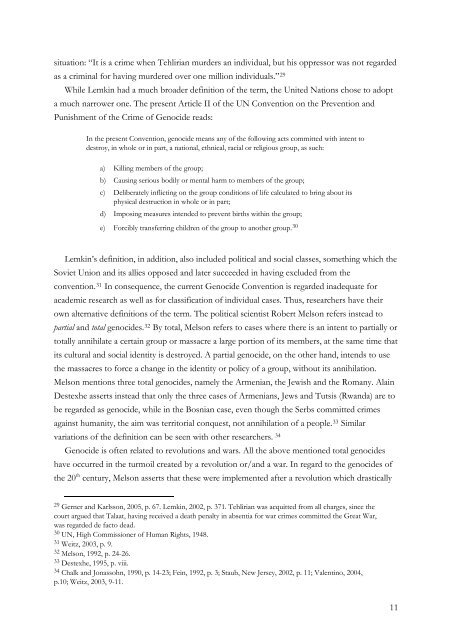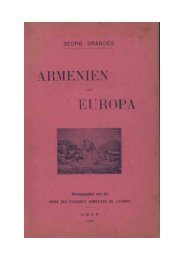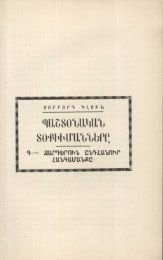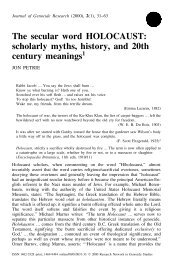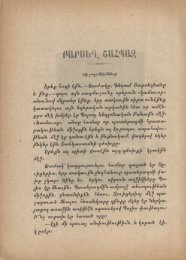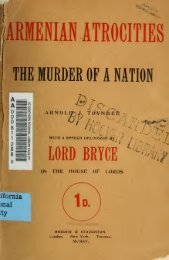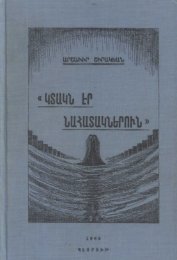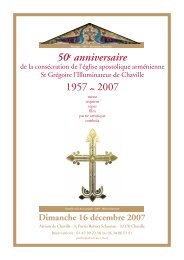etween 1894 and 1920. The second book, Svärdets år, is, on the other hand, about the massacresof the Christians in the Ott<strong>om</strong>an Empire and covers the period between 1894 and 1922. Itsrendering of the events is more detailed than that in Längtan till Ararat, and it does mention s<strong>om</strong>eof the dipl<strong>om</strong>atic documents presented in this paper, even though in a much limited extent. Andlike the former book, this too presents rather a descriptive than an analytic discussion of the issue.Nevertheless, there are s<strong>om</strong>e analytic discussions in regard to the presented information andpossible interpretation of the Swedish reaction and its underlying causes.1.3 Theory and HypothesisFor answering the questions formulated above, this paper rests on three main cornerstones,namely genocide, bystander and the foreign policy of small states. The central issue discussedhere is the Armenian genocide, and in order to understand why and when massacres bec<strong>om</strong>egenocide, it is essential to give a short description of the existing definition of the term genocideand of genocide denial. Turning to the question about how Sweden, as a small neutral state, couldhave acted, one needs to first address the theory regarding foreign relations and decision makingof states in general and that of small, and often neutral, states as a sub class of its own. In orderto connect genocide and genocide denial to how a small neutral state may act (or choose not to)towards a genocide in progress, the role of the bystander is used to describe and understand theactions of an actor in such a matter.1.3.1 Genocide and Genocide DenialIn order to understand the issue at hand, we must first understand the meaning of genocide andits intertwining dynamics, its aim, and the methods which are planned and implemented toachieve the goal.The term Genocide, derived fr<strong>om</strong> genos (Greek for family, tribe or race) and cide (derivative ofLatin’s cidium, “killing”), was coined internationally in 1946 by Raphael Lemkin, a lawyer ofPolish-Jewish origin, while drafting Resolution I:96 for the Security Council of United Nations. 27Lemkin’s thoughts went to the Armenian massacres during World War I and the massacres ofthe Arameans in Iraq during the 1930s. 28 Lemkin was present at the trials of Sogh<strong>om</strong>on Tehlirian,a survivor of the Armenian Genocide, accused of killing Talaat Pasha, the former InteriorMinister of Turkey and one of the key instigators to the Armenian Genocide. Tehlirian hadtracked Talaat to Berlin where the latter had escaped to avoid trials in Constantinople, accused ofc<strong>om</strong>mitting war crimes, and shot him dead. At the trials Lemkin realized the paradox in the27 Mace, 2002, p. 65.28 EuropaWorld, June 22, 2001.10
situation: “It is a crime when Tehlirian murders an individual, but his oppressor was not regardedas a cri<strong>min</strong>al for having murdered over one million individuals.” 29While Lemkin had a much broader definition of the term, the United Nations chose to adopta much narrower one. The present Article II of the UN Convention on the Prevention andPunishment of the Crime of Genocide reads:In the present Convention, genocide means any of the following acts c<strong>om</strong>mitted with intent todestroy, in whole or in part, a national, ethnical, racial or religious group, as such:a) Killing members of the group;b) Causing serious bodily or mental harm to members of the group;c) Deliberately inflicting on the group conditions of life calculated to bring about itsphysical destruction in whole or in part;d) Imposing measures intended to prevent births within the group;e) Forcibly transferring children of the group to another group. 30Lemkin’s definition, in addition, also included political and social classes, s<strong>om</strong>ething which theSoviet Union and its allies opposed and later succeeded in having excluded fr<strong>om</strong> theconvention. 31 In consequence, the current Genocide Convention is regarded inadequate foracademic research as well as for classification of individual cases. Thus, researchers have theirown alternative definitions of the term. The political scientist Robert Melson refers instead topartial and total genocides. 32 By total, Melson refers to cases where there is an intent to partially ortotally annihilate a certain group or massacre a large portion of its members, at the same time thatits cultural and social identity is destroyed. A partial genocide, on the other hand, intends to usethe massacres to force a change in the identity or policy of a group, without its annihilation.Melson mentions three total genocides, namely the Armenian, the Jewish and the R<strong>om</strong>any. AlainDestexhe asserts instead that only the three cases of Armenians, Jews and Tutsis (Rwanda) are tobe regarded as genocide, while in the Bosnian case, even though the Serbs c<strong>om</strong>mitted crimesagainst humanity, the aim was territorial conquest, not annihilation of a people. 33 Similarvariations of the definition can be seen with other researchers. 34Genocide is often related to revolutions and wars. All the above mentioned total genocideshave occurred in the turmoil created by a revolution or/and a war. In regard to the genocides ofthe 20 th century, Melson asserts that these were implemented after a revolution which drastically29 Gerner and Karlsson, 2005, p. 67. Lemkin, 2002, p. 371. Tehlirian was acquitted fr<strong>om</strong> all charges, since thecourt argued that Talaat, having received a death penalty in absentia for war crimes c<strong>om</strong>mitted the Great War,was regarded de facto dead.30 UN, High C<strong>om</strong>missioner of Human Rights, 1948.31 Weitz, 2003, p. 9.32 Melson, 1992, p. 24-26.33 Destexhe, 1995, p. viii.34 Chalk and Jonassohn, 1990, p. 14-23; Fein, 1992, p. 3; Staub, New Jersey, 2002, p. 11; Valentino, 2004,p.10; Weitz, 2003, 9-11.11
- Page 3 and 4: 1 Introduction.....................
- Page 5 and 6: War, rather confirm the version of
- Page 7 and 8: 1.2 Previous ResearchWhen discussin
- Page 9: Military Attaché and the missionar
- Page 13 and 14: in the following investigation, whi
- Page 15 and 16: killed. The slaughterer slaughtered
- Page 17 and 18: interests. Despite his famous “14
- Page 19 and 20: morality, balance of power, or the
- Page 21 and 22: 4. International organisations (e.g
- Page 23 and 24: warring parties. 104 This observati
- Page 25 and 26: Concerning the protocols of the Swe
- Page 27 and 28: present in Turkey. These documents
- Page 29 and 30: He also mentions meeting an Armenia
- Page 31 and 32: the annihilation. General von Losso
- Page 33 and 34: 1.5 BackgroundIn order to understan
- Page 35 and 36: 1914, when two inspector-generals f
- Page 37 and 38: to Islam or were sold as slaves to
- Page 39 and 40: 2 Empirical AnalysisThe empirical r
- Page 41 and 42: It does not seem to be the Turkish
- Page 43 and 44: The Turks claim that, at the Russia
- Page 45 and 46: The Armenian population has equippe
- Page 47 and 48: 1917 was the revival year for the A
- Page 49 and 50: Even if the communication between t
- Page 51 and 52: implemented against the Armenian na
- Page 53 and 54: Anckarsvärd continued claiming tha
- Page 55 and 56: Germany is blamed for its accessory
- Page 57 and 58: Here Wirsén took the liberty to co
- Page 59 and 60: On February 19, news of new Armenia
- Page 61 and 62:
estricted to the fields of intrigue
- Page 63 and 64:
generous offer of President Wilson
- Page 65 and 66:
Lange gave a detailed description o
- Page 67 and 68:
skin was totally scorched. Another
- Page 69 and 70:
which her recurrently emphasised th
- Page 71 and 72:
The sooner calls referring to the A
- Page 73 and 74:
Despite these facts, Armenia was th
- Page 75 and 76:
Svenska Riksarkivet [Swedish Nation
- Page 77 and 78:
Bakhtiari, Kalla det vad fan du vil
- Page 79 and 80:
Chan, Steve and Drury, Cooper A., S
- Page 81 and 82:
Moranian, Suzanne Elizabeth, Bearin


